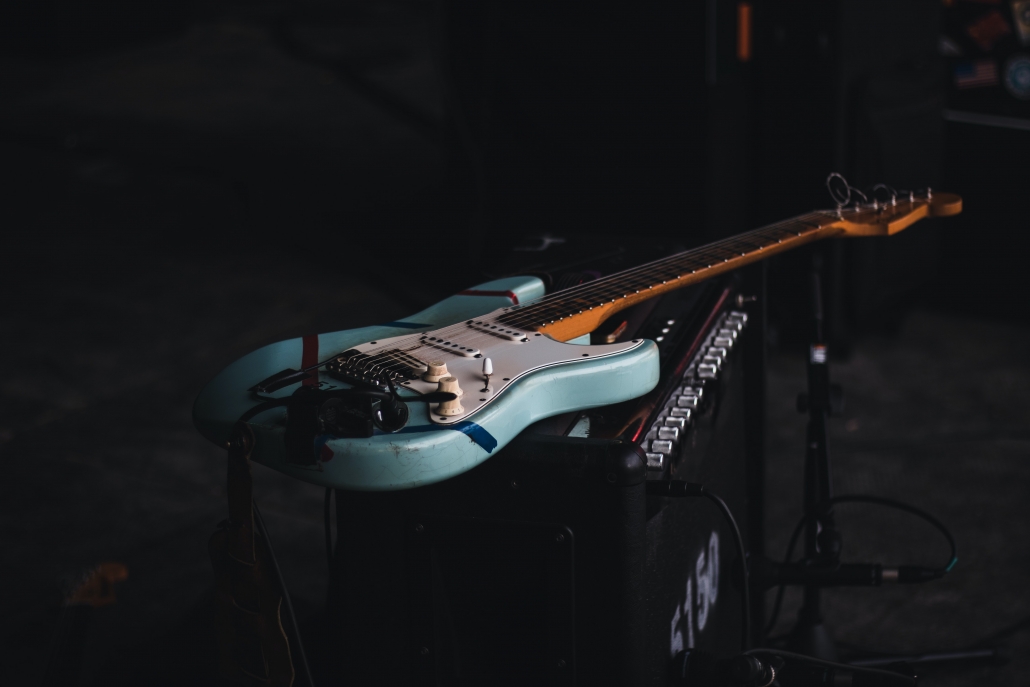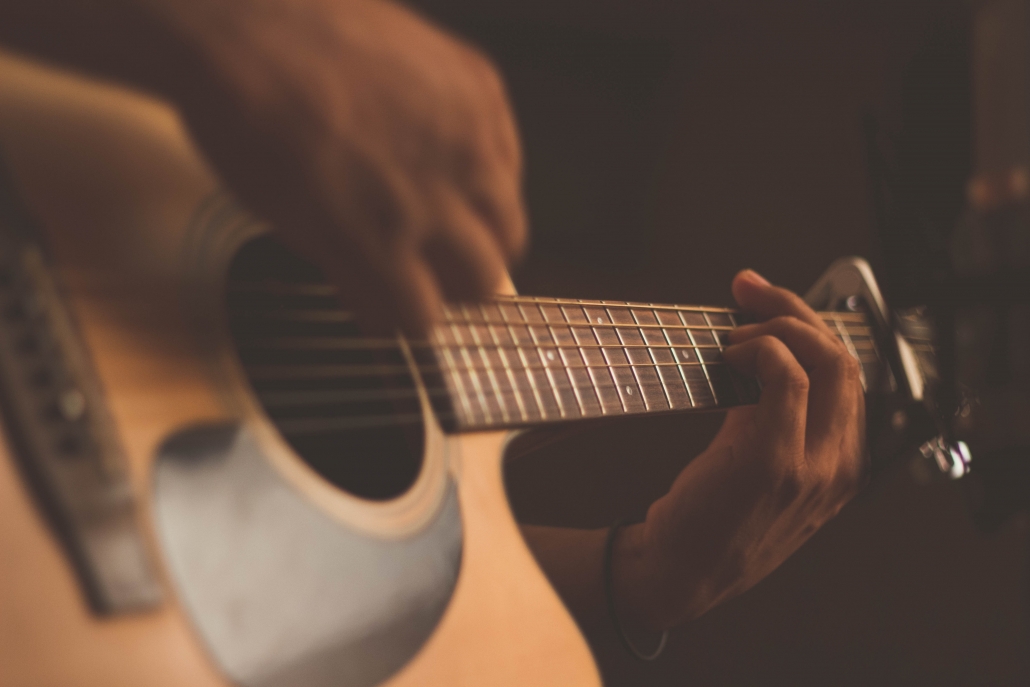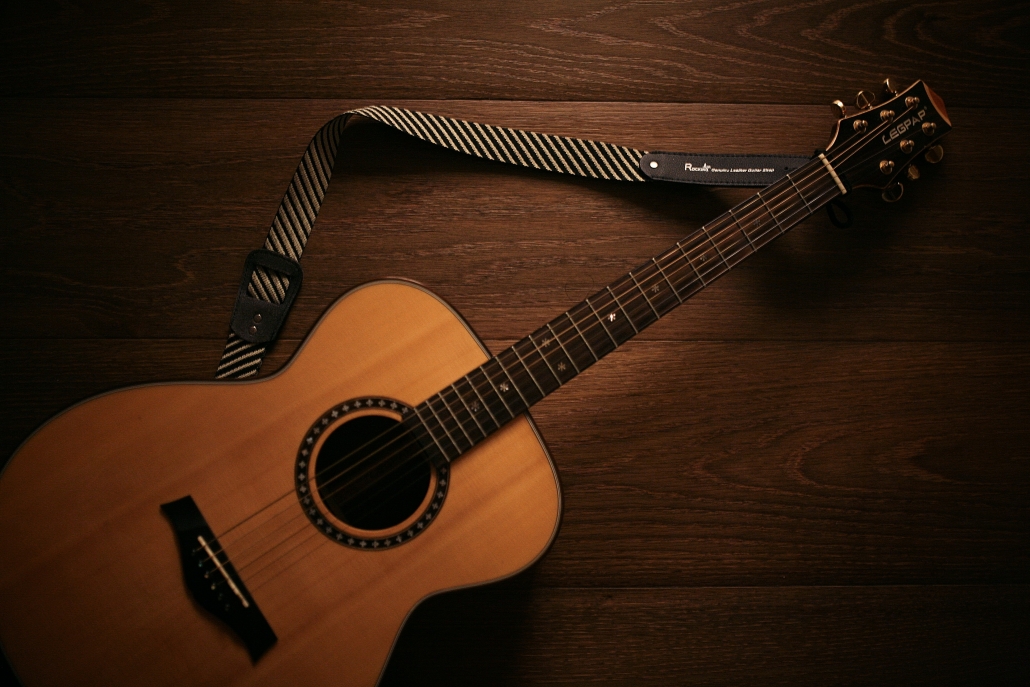 Before you start taking guitar lessons, there are a few things you should know! Guitar teacher Ryan B. shares six things everyone should know about learning guitar…
Before you start taking guitar lessons, there are a few things you should know! Guitar teacher Ryan B. shares six things everyone should know about learning guitar…
It really is a magical moment when you first pick up a guitar. The feel of the wood, the tension on the strings, the way the curve of the body fits just right on your lap. You’re filled with visions of yourself on stage playing for thousands who worship your every note.
The problem is the next moment isn’t quite so magical.
You try to play a chord, but the only sounds are dull thuds and ceaseless buzzing. Your clumsy fingers just can’t figure out how to coax music out of this cursed piece of wood.
For so many, frustration is where their experience learning guitar begins and ends. But going into it with the right mindset can make all the difference and lead to a nice payoff.
Guitar can be a really rewarding instrument to learn, but it can also be quite challenging. If you’re thinking about picking up the guitar or are already in the midst of learning, check out these five tips to help you make the most of your experience.
From choosing the right guitar to mastering simple chords, these pointers will set you on the path to becoming a bonafide six-string pro!
Can I Teach Myself Guitar?
Although learning guitar by yourself is possible, you’ll want to make sure you have the right tools. Consider:
- Learn the fundamentals first, like proper hand positioning
- Master simple chords and notes
- Work on your strumming patterns
- Practice scales
- Master a few simple songs
- Signing up for guitar lessons on TakeLessons!
Another helpful way to learn guitar is to watch videos. Many online guitar lessons include videos as part of their instruction so you can see exactly what you need to do. Here’s an example of what you might learn in an online guitar lesson:
How Do I Start Learning to Play the Guitar?
Here are a few things to keep in mind as you’re starting on the guitar:
1. Your Hands Need Some Exercise
There are 35 muscles that control your fingers! And you’re going to need each one of those to make your guitar strings hum just how you hear them in your head. So when you practice, especially in the beginning, remember to warm up and stretch (here’s a great video) so you don’t hurt yourself. And keep in mind that after a long session you might have sore hands and forearms.
2. Practice is Really Boring Sometimes
Just like anything else, practicing your guitar can get extremely monotonous. After a hundred times practicing that new scale or picking pattern and still needing more work, it’s really easy to give up and play something easier. But to get better you really have to hunker down and put in the hours necessary (in fact they say you need to practice something for 10,000 hours before you master it!).
3. Take Good Care of Your Instrument
You’ve been practicing every day and really making progress towards your goals, but one day during a particularly intense session you break a string (or input jack, or neck…). The problem is you don’t know how to fix it, and so your guitar sits and collects dust and all your skills melt away. It’s a common story, one that happens far too often. Learning some simple maintenance like changing strings, cleaning the neck and a bit of basic wiring can go a long way towards preventing lapses in your practice because of something as simple as a busted string.
4. The Fastest Way to Learn is to Slow Down
Everyone wants to play their favorite lick right when they pick up the guitar. When you try to do this, though, you’re either going to fail miserably and inevitably give up or learn it very very poorly. Before you get to killer solos you have to master your scales. And in order to master your scales you have to learn to do your scales very… slowly… In order to really shred through those suckers, you’ve gotta get them perfect going at a snail’s pace and then slowly pick up the tempo. And then once you’ve mastered that, then you move on up to the next step. And so on and so forth…
5. Ditch the Phone
I’ll be the first to admit that I’m addicted to my phone. If I’m away from it for just a few minutes I start to get jittery and extremely curious about my friends’ Facebook walls. But too many distractions will keep you from getting productive practice time in. This might mean getting a dedicated guitar tuner instead of an app so you don’t even need your phone in the room with you. Hopefully you can spend the next hour learning guitar and not looking at cute cat videos.
6. Take a Break
Now you’ve been doing scales for hours, and despite getting rid of obvious distractions, you’re still having trouble focusing. Maybe you need a break. You need to be able to put the work in, but if you’re getting too stressed it will also hurt your practice (and make your fingers too tense- which is not a good thing). Every once in a while, take a few minutes to play a fun easy song or watch that silly cat video you’ve been putting off. Maybe even a quick power nap.
7. Find the Right Guitar
Another area that many people overlook when they are learning guitar is how important finding the right instrument is. Before you start learning guitar, you need to make sure you have the right guitar.
Consider the following factors:
- Price
- Style
- Your age and size
- The condition of the guitar
- Where you will buy the guitar
As a new guitar player, you might want to avoid making the purchase at a local yard sale, flea market, or pawn shop – unless you’re shopping with a more experienced guitar player who knows exactly what to look for.
In general, a guitar will cost you somewhere between $300 and $500, though it’s certainly possible to find instruments that cost far less than this.
8. Work On Your Chords
Crucial elements to master if you want to learn how to play guitar are chords. You can’t learn to play guitar unless you know a few basic chords.
Some of the most important chords for new guitarists to learn are C, D, G, and E minor. These chords are used in all kinds of guitar songs – even some of the easier ones. Make sure you master them before you move on to anything else!
9. You Need to Know How to Tune a Guitar
One more thing you need to master as a guitar player is tuning. Although this might not be the first thing you learn in your guitar lessons, it’s something you will absolutely need to master before you can become a skilled guitar player.
Without knowing how to tune a guitar – and to tell whether it’s in tune to begin with – you are going to sound off-pitch and just downright unpleasant. Follow this guide to learn how to tune your guitar and check that it’s in tune regularly!
10. You Can’t Go it Alone
I’m referring here to the equipment you need besides just the guitar alone – but of course, if you want to know how to learn guitar, you’re going to need some people by your side, too. Guitar learning is far easier if you have fellow musicians to help you learn the ropes.
However, what I’m mostly talking about here is the other gear you need.
When you are a new guitar player, it’s easy to get all wrapped up in what kind of guitar you’ll buy. After all, that’s the most exciting – and most important! – part. However, it’s not just a guitar you need.
You also need other equipment, such as a:
- Metronome
- Capo
- Tuner (options include microphone-based tuners, pedal tuners, vibration based tuners, and more)
- Guitar strap
- A few different guitar picks
- A cable and small practice amp (if you’re planning on learning electric guitar)
Learning Guitar is Easier With Your Favorite Songs
You’ll have a much easier time mastering the guitar if you know some easy songs to learn on guitar.
While the easiest songs to learn on guitar will vary between players – some tunes just come more naturally to some people than they do to others – you can find some of the easiest songs to learn on guitar listed in the round-up below:
- The 50 Best Guitar Songs Ever From Different Eras & Genres
- The 50 Best Easy Acoustic Guitar Songs
- 10 Easy Guitar Songs for Beginners
- 100+ Easy Guitar Songs
- 5 Basic Guitar Chords & 20 Easy Guitar Songs for Beginners
- #TBT To the 90’s: 50 Easy Guitar Songs for Beginners
- Extremely Easy Guitar Tabs for Popular Songs
How Long Does it Take the Average Person to Learn Guitar?
The best way to learn guitar? Be patient with yourself. It takes everyone a different amount of time to learn to play guitar, so don’t try to compare yourself to some false metric. Go at your own pace!
How long does it take to learn the guitar? On average, if you practice for around 30 minutes a day, three to five days a week, it will take you a month or two to learn some beginner guitar songs.
You’ll need around six months to play more advanced songs, though again, this can vary.
Is Guitar Hard to Learn?
Though it may seem difficult at first, with the right tools and resources, learning to play the guitar can be a fun and rewarding experience.
We hope that these tips have helped you better understand what is involved in learning to play the guitar, as well as give you some ideas on how to get started. If you’re still feeling overwhelmed or uncertain about where to go from here, consider seeking out professional instruction.
With the help of a skilled teacher, you can make great strides in your guitar-learning journey and be playing your favorite songs in no time.
There’s a lot more to learning guitar than just these, but I hope that these tips can help you along your musical journey. Happy pickin’!
Get personalized tips and tricks for learning guitar by taking private lessons with a guitar teacher. Guitar teachers are available to work with you online via Skype or in-person depending on locations and availability. Search for your guitar teacher now!
 Ryan B. teaches guitar, banjo, and mandolin in Chicago, IL. A graduate of the University of Illinois, he can teach his students music theory, and as a member of a traveling local band, he can also help with songwriting! Learn more about Ryan here!
Ryan B. teaches guitar, banjo, and mandolin in Chicago, IL. A graduate of the University of Illinois, he can teach his students music theory, and as a member of a traveling local band, he can also help with songwriting! Learn more about Ryan here!
Photo by afunkydamsel
Megan L.






